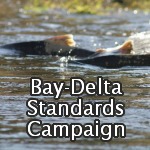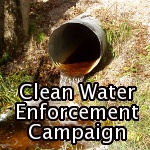On 14 April 2017, the California Sportfishing Protection Alliance (CSPA) submitted extensive comments on proposed amendments to the Central Valley Regional Water Quality Control Board’s (Regional Board) Water Quality Control Plan for the Sacramento and San Joaquin Valleys (Basin Plan). The proposed amendments address salinity limits in the San Joaquin River upstream of Vernalis. CSPA prepared and submitted the comments on behalf of itself, the California Water Impact Network, Pacific Coast Federation of Fisherman’s Associations, AquAlliance, Institute for Fisheries Resources and the Environmental Water Caucus.
Seventeen years ago, the State Water Board ordered the Regional Board to move the present San Joaquin River salinity compliance point at Vernalis upstream in order to protect beneficial uses in the River. The Regional Board never did so, despite repeated complaints from CSPA. Finally, the Regional Board asked CV-Salts, a stakeholder group, comprised of water agencies, irrigation districts and farmers, to develop a proposed Basin Plan Amendment establishing a salinity compliance point at Crows Landing on the river near Turlock. CV-Salts, in turn, formed a Lower San Joaquin River Committee (LSJR Committee) that concluded that almonds were the most sensitive beneficial use on the San Joaquin. The proposed salinity limits, which will be considered by the Regional Board in June 2017, are as much as two and a half times the present Vernalis salinity limits.
Among numerous deficiencies, CSPA pointed out that the LSJR Committee never identified or analyzed the various critical life stages of fish species that migrate and spawn in the river. These include salmon, steelhead, green and white sturgeon, striped bass, threadfin and American shad and splittail. Sensitive life stages of these species are considerably more sensitive to salinity than almonds and these fisheries have already been grievously harmed by excessive concentrations of salinity. If the Regional Board approves the proposed Amendment, CSPA is prepared to oppose it all the way through the courts, if necessary.









